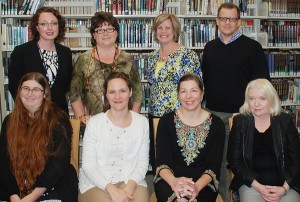2018 School Spending Survey Report
Are Press Releases A Thing of the Past?
With all the excitement over social media and reports of newspapers closing or shifting focus to keep ad revenues rolling in, libraries have taken a hit with ever decreasing coverage. You might even be thinking whether it’s worth the effort to create media releases. The quick answer is yes. If well written and interesting they can amplify your message reaching reporters, bloggers and the general public through your web and social media channels. But if you want to have larger value-driven articles published, you’ll need to step up your game and pitch those story ideas to reporters.

Nancy Dowd
This is the first in a series of six columns on how libraries are tackling their advocacy challenges. With all the excitement over social media, and reports of newspapers closing or shifting focus to keep advertising revenues rolling in, libraries have taken a hit with ever decreasing coverage. You might even be wondering whether it’s worth the effort to create media releases. The quick answer is, yes. If well written and interesting, they can amplify your message, reaching reporters, bloggers, and the general public through your web and social media channels. But if you want to have larger value-driven articles published, you’ll need to step up your game and pitch those story ideas to reporters. The easiest way to start is to revamp your existing press release. Start by implementing these tips:1. Create a News Page on Your Website

Kathy Dempsey
Keep it simple: list your library's name; full address, including state and zip code; and contact names, with phone numbers and email addresses and links, to all of your press releases. According to the author/editor of Marketing Library Services, Kathy Dempsey, "It's vital to realize that, if you want press coverage, you need a page on your website to serve that specific target audience. If you show that you're media-savvy, by having a page with high-quality photos of your library and director, your press releases, annual report, stats, and mission statement, then you're much more likely to get press coverage. When reporters are on deadline (which is always), we want an actual name and phone number of a reliable contact who can help immediately. If you don't provide that, you're much less likely to get press coverage."2. Make It Easy to Read
You can get your message out with or without traditional media as long as it’s short and interesting.- Abandon long paragraphs. Use bullet points to highlight important information.
- Include compelling quotes from staff members and customers to add interest and a new point of view.
- Provide relevant links, key words, and contact information (both email address and phone number).
- Add links to videos that enhance your story (think YouTube and Vine).
- Cross promote with your offerings—include a brief reading list on the topic or links to articles from your databases.
3. Socialize Your Content
People love to share interesting content, so make it easy for them to look good. Write headlines and quotes that will read well as tweets and Facebook updates, and include photos perfect for Pinterest. King County Library System Public Relations Specialist Marsha Iverson has built a Twitter following of reporters and local influencers. She tells the story of how one cheeky-toned tweet caught the attention of a local website, which then retweeted it out to their 2,000+ followers. After a few direct messages, Marsha was able to provide them with videos, and the whole story escalated to a new level. She advises folks to use the tone that is right for the platform, and be prepared to offer additional content such as videos to keep a story going.4. Share Content That Matters to Your Community

Brenda Thomson
Nothing will create a positive perception of your library better than a major news story illustrating how your library is helping to resolve community problems. Brenda Thomson, community relations coordinator for the Natrona County Public Library in Wyoming, says the library's market research indicated the community was more interested in their collections than events. As a result, the staff shifted their focus in the library’s biweekly newspaper column. They still include some information about events, but are sure to share stories about services and collections. They also utilize the column to explore important initiatives, such as literacy. She’s able to keep up with the schedule by tapping into the library staff’s expertise. “We’re a small operation (I’m the only marketing/PR person), so we assign articles to many different individuals.”5. Taking it To the Next Level—Pitching a Story to the Media
Are you intimidated with the thought of pitching a story to a newspaper? Getting a reporter to write a news item, feature story, or even a positive editorial in support of your library isn’t as scary as you may think. These five tips will help you land that story!- Know Your Reporter Take the time to know who is reporting on your town. Even though it’s not always easy, the effort will pay off. In her small Wyoming town, Thomson continually works to build relationships with the local reporters, but since she is in a small market, there is a high turnover. She says the secret to her success is pretty basic. “We consistently give reporters precisely what they need and they come back.” If your town is a little bigger or you don't have time to build personal relationships, at the very least read all the recent articles that reporters have written about your library and on the topics surrounding your story. This not only gives you a knowledge base, it will help you understand how the writer approaches a story.
- Pitch a Newsworthy Story Newspapers have to sell papers. As much as they may love your library, they won't run a story that isn't timely and relevant to the community. "The key is to be aware of the issues facing your community and look for relevant connections to your library,” advises library consultant Pam Jaskot. Sometimes your library might offer a solution and play a major role in the story. Other times, you may provide the research a reporter needs to write a better story. Remember the five factors for evaluating if a story is newsworthy are: timing, importance, proximity, prominence, and human interest.
- Keep Your Communications Clear and Concise Start strong with the issue you are addressing and the connection to your library. Include enough information to make your case and offer links to supporting details. Be clear about your "ask" —what you want the reporter to do.

Chesterfield County Public Library community services team
Chesterfield County Public Library Services Administrator Carolyn Sears and her team have had great success pitching stories. “The typical email pitch will contain a brief, friendly paragraph about the event, why it is important to the community, how it fits into CCPL’s mission, and details to attend/participate/learn more. We often include photos and supplemental material—such as any study we reference, photos/video, or an interesting infographic. We make sure to mention anything ‘newsworthy’—number of attendees, partnerships, relevance to any other national/local issues,” she explained. If reporters are interested, they usually call to schedule a 20-30 minute interview by phone or in person. “Oftentimes, this results in the same information begin repeated, but allows for them to steer the conversation and get one or two quotes they like to accompany the story,” explained Sears. Sears loves to end the interview by telling the reporter about their next big event/roll-out. “I run a couple by them, if necessary, to see what they react to, and give them the date and tell them I’ll call them as it approaches. You’re much more likely to get a response when they’ve already expressed interest.” - Do the Legwork for the Reporter When I was director of marketing for the NJ State Library, the library requested an interview in hopes of getting an editorial supporting restoration of our funding. Not only did we bring the State Librarian and executive director of the NJ Library Association to the face-to-face, but we also had community members whose lives would be impacted by the decision so that they could speak directly with the editors. The meeting was successful, resulting in a positive editorial. Even if you aren’t meeting with a reported in person, you should be prepared to provide phone numbers and availability schedules for people to be interviewed.
- Always Say Thank You Whether the story runs or not, thank the reporter for their time. Sometimes a reporter will champion a story to their editor out of a commitment to your library rather than the strength of the pitch. If that were to happen, make sure you let them know you appreciate their efforts. Reporters are people too! It doesn't hurt to remind your supporters to extend their thanks as well through email or letters.
Nancy Dowd is the co-author of ALA’s bestselling book, Bite-Sized Marketing: Realistic Solutions for Overworked Librarians and is leading the development of NoveList’s newest product, LibraryAware. She writes the “The M Word Blog,” and is a popular speaker on the topic of marketing throughout the US and in Canada and Europe.
RELATED
RECOMMENDED
TECHNOLOGY
ALREADY A SUBSCRIBER? LOG IN
We are currently offering this content for free. Sign up now to activate your personal profile, where you can save articles for future viewing









Add Comment :-
Comment Policy:
Comment should not be empty !!!